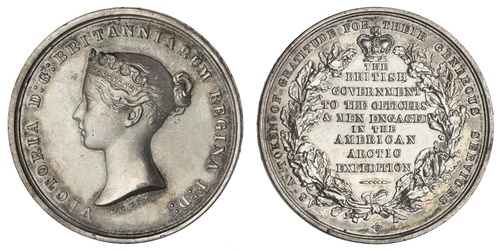
Auction: 347 - The Numismatic Collector's Series Sale
Lot: 76
Great Britain. Second Grinnell Expedition. Special Sea Gallantry Medal Awarded to Officers and Crew of the American Arctic Expedition, 1856. Silver, 32mm. By L.C. Wyon. Awarded to: JEFFERSON TEMPLE BAKER (edge). Young head of Victoria left, rev. legend within wreath, crown above, legend around.
In 1845, the British voyage of Arctic exploration led by Captain Sir John Franklin left England aboard two ships -- HMS 'Erebus' and the HMS 'Terror'. The ships became icebound in Victoria Strait near King William Island in what is now the territory of Nunavut. The fate of the 129 men of the expedition remained unknown, and many subsequent expeditions were launched to find Franklin and his men -- with searches continuing through much of the 19th century.
In 1850, retired NY Merchant, Henry Grinnell financed a polar expedition to search for the lost Franklin Expedition. The vessels returned without resolving the mystery, although they did discover Franklin's first wintering camp at Beechey Island. Undeterred, Grinnell equipped the 144-ton brig 'Advance' for a second voyage, this time under Elisha Kent Kane, on behalf of the U.S. Navy to search for Franklin. Grinnell received additional support from the Geographical Society of New York, the Smithsonian Institution, the American Philosophical Society and financier George Peabody. In July 1853, the 'Advance' reached the northern Danish settlements at Fiskenaesset and Upernavik Greenland. The expedition then explored areas northwest of Greenland in what is now called Grinnell Land.
But in August 1854, the 'Advance' became icebound and could not be freed. Beleaguered by brutal conditions and scurvy, Kane and his men were finally able to try to escape nine months later. On May 17, they set off on a 1,300 mile voyage with sledges manhandled by the recently invalid crew. They reached open whaling waters August 1 and Upernavik seven days later. On September 6, they secured passage aboard the Danish vessel 'Mariana' for the Shetland Islands; and finally arrived in New York, October 11.
A total of nine gold and nine silver medals were struck in January 1856 on behalf of the British Government to present to members of the Second Grinnell Expedition. Kane's hunting companion, this medal's awardee, seaman Jefferson Temple Baker, did not survive, dying from tetanus on August 7, 1854. He is buried at North Point, Observatory Island.
Extremely Rare. Lightly toned. Choice Extremely Fine. ex Spink, May 20, 1991, lot 107.
Sold for
$4,750




